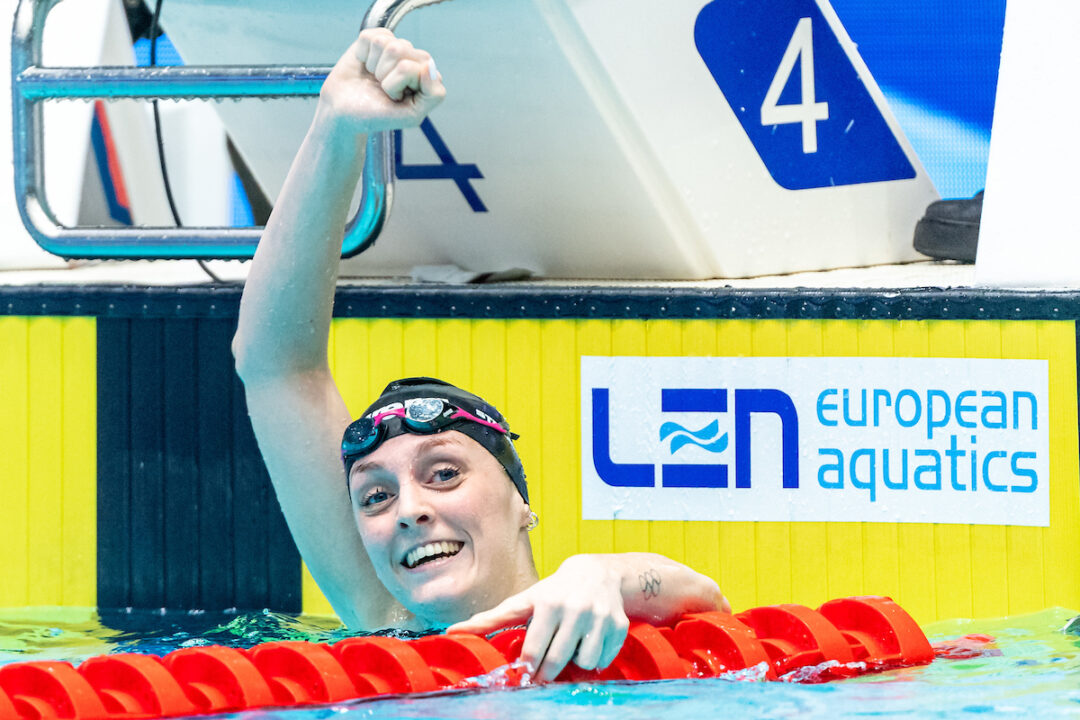2022 EUROPEAN AQUATICS CHAMPIONSHIPS
- Thursday, August 11 – Wednesday, August 17, 2022 (pool swimming)
- Rome, Italy
- Parco Del Foro Italico
- LCM (50m)
- Start Times
- Prelims: 9:00 am local / 3:00 am ET
- Finals: 6:00 pm local / 12:00 pm ET
- Meet Central
- Event Schedule
- Entries
- Live Results
- Live Stream
- Day 1 Finals Heat Sheets
The Dutch are bringing home some new hardware from Euros this year.
A speedy anchor leg by Marritt Steenbergen helped the Netherlands edge two-time defending champion Great Britain for their first-ever title in the women’s 4×200-meter freestyle relay on Thursday. The 22-year-old Steenbergen entered the water one-tenth of a second behind Freya Anderson and powered the Dutch to a comeback win with a total time of 7:54.07, more than half a second ahead of the Brits.
WOMEN’S 4×200 FREESTYLE RELAY – FINAL
- World Record: 7:39.29, Australia – 2022 Commonwealth Games
- European Record: 7:45.51, Great Britain – 2009 World Championships
- European Championship Record: 7:50.53, Italy – 2014
- 2020 European Champion: Great Britain, 7:53.15
- Netherlands, 7:54.07
- Great Britain, 7:54.73
- Hungary, 7:55.73
- Italy, 7:58.83
- Germany, 7:59.89
- France, 8:01.82
- Poland, 8:03.04
- Sweden, 8:09.48
“We are shouting out our happiness, we are very satisfied as this is our first medal in this event,” Steenbergen said. “It’s long a time that we haven’t swum together so we are so glad to be together. We knew that we could get a medal, but there were seven more teams in the final and one can always better you. However, today we were the best ones. We are happy to win this gold.”
After qualifying for Friday’s 100 free final earlier in the session, Steenbergen threw down a blazing 1:56.26 split, more than a second faster than her best flat-start time of 1:57.28 from 2017. It ranks as the 12th-fastest split in the world this year, with Anderson’s 1:56.05 from June’s World Championships sitting just a few spots ahead.
Anderson was nearly a second slower in Rome, less than two weeks removed from a packed schedule for Team England at the Commonwealth Games. She split 1:57.02 on the anchor leg to secure a silver medal for Great Britain.
“Oh, I started off too late,” Anderson said. “The girls worked really hard to put me in a very good position – though I’m still happy that we got a medal.”
Steenbergen was one of two swimmers to swim a sub-1:57 split in the final along with 20-year-old German Isabel Marie Gose (1:56.93).
Joining Steenbergen on the victorious Dutch team were Imani de Jong (1:58.97), Silke Holkenborg (1:58.92) and Janna Van Kooten (1:59.92). The 20-year-old de Jong was less than one-tenth of a second slower than her personal-best time of 1:58.88 from April. Holkenborg was just .22 seconds slower than her personal best, also from April.
“It was unbelievable, a great surprise, it was special to win with this team,” Holkenborg said. “This is my first medal at the senior European Championships and now I hope to keep this pace in the individual events, in the 200m and 400m free.”
Van Kooten, 17, had the slowest split on the Dutch team, but the quickest reaction time of the entire race, getting off the blocks just .04 seconds after Holkenborg touched the wall.
Preceding Anderson on Great Britain’s relay squad were Freya Colbert (1:58.72), Lucy Hope (1:58.98) and Medi Harris (2:00.01). At last year’s Euros, the Brits won by more than three seconds while Netherlands didn’t even qualify for the final.
At last year’s Euros, Great Britain won by more than three seconds and Netherlands didn’t even qualify for the final. The Dutch placed 6th in 2018 and took bronze back in 2016.
Splits comparison
| Netherlands | Great Britain | |
| First 200 | Imani De Jong, 1:58.97 | Freya Colbert, 1:58.72 |
| Second 200 | Silke Holkenborg, 1:58.92 | Lucy Hope, 1:58.98 |
| Third 200 | Janna Van Kooten, 1:59.92 | Medi Harris, 2:00.01 |
| Fourth 200 | Marrit Steenbergen, 1:56.26 | Freya Anderson, 1:57.02 |
| Total | 7:54.07 | 7:54.73 |
The Netherlands’ team would have placed 7th in last summer’s Olympic final with that time.
In other news, Katinka Hosszu had a bit of trouble on the third leg (2:00.62) for Hungary, but she still earned bronze to up her career tally to 97 international medals. We could potentially see Hosszu hit the century mark by the end of the meet.
“Well, I’m here the old lady in the team,” Hosszu joked. “Checked with the girls, when I swam in my first junior Europeans, the youngest ones were not even born. I pushed too hard over the first 100m, so I died for the second half – but the girls were awesome and I’m really grateful for them as they were fantastic.”
In the men’s 4×200 free final right after the women’s race, Kristof Milak (1:44.42) helped Hungary clinch its first title in the event in 68 years. Milak was joined by Nandor Nemeth (1:46.28), Richard Marton (1:47.01) and Balazs Hollo (1:47.67), who combined to lower the national record of 7:06.27 that the same quartet set at the World Championships in June.

“Steenbergen threw down a blazing 1:56.26 split”? Please, let’s not misuse superlatives. Titmus’ relay split a week or so ago (1.52.8) was a blazing split – 1.56.26 is good, but nothing more. How many sub 1.56 relay splits have there been at Worlds or Comm Games this year – quite a few.
Blazing is probably not the best term to have been used when viewing in the wider global context but MAY be appropriate in the context of this race itself and its impacts on the race ….. and maybe due to it being somewhat unexpected.